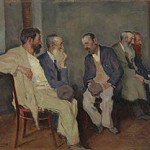2 – The Institution and the Group
Every social group must satisfy certain basic needs because people have to eat, play, rest, heal, love, etc. When there is more then one person, the satisfaction of most of those needs is achieved either through self-organization or creating an organized system.
Self-organization requires an in-depth knowledge about the other people in the group. The requirement for an organized system is abstract-thought capability because is necessary to create out of the blue an organized system, a set of rules that before only existed in peoples mind; i.e. an institution. An institution is a rule, use, law or tradition that people agree upon or accept. Once an institution is created it will deal and intermediate between people. Examples of institutions are taxation system, marriage, the language, traditions, monarchy, the constitutions, markets, laws, etc.
Each institution is responsible for a task or action inside group’s life, and those affected by this task must delegate the knowledge to handle the task to the institution. Since any institution intermediates between individuals -because it takes care of some of their relations-, the institutions partly determines the behavior within the group and the knowledge people can access.
3- Knowledge inside the Group
Interpersonal relationships play a key role in the overall development of an individual within a group. Through these relations the individual gets an important social feedback that reinforces his/her adaptation in the group. While interacting and communicating with people, the person obtains knowledge about the other persons and about himself, and thanks to this knowledge the person can fine-tune its behavior inside the group and be conscious of the links he is establishing with people.
When an institution intermediates between people, it acts like a black-box that gets some inputs from persons, process the information, and outputs some guidelines for the people to follow. So, in the natural process of interacting and communicating that people establish to know each other, now there is a filter that blurs the emotional knowledge that people may acquire and process the rational knowledge of each person involved in the social link. Because of the presence of an institution in between people, there is a change in the feedback that a person will receive from the others. People do not get any more transparent information in the rational or the emotional channels. Between you and me now there is an institution. Thus it becomes more difficult for the people linked by relationships to obtain a good understanding of each other.
For example, lets suppose that every morning you have to take care of your family and wake them up. When you do this every morning, you learn their reactions and the way you have to act in order to wake up each person. You know if somebody needs a bit more sleep, if somebody is already awake, if somebody had a stormy night or somebody sleeps like an angel. You may found as well, how it changes your mood when somebody is really grumpy, or another one looks like is glued to the bed-sheets or when somebody wakes up with a smile and gives you a kiss. Interacting with people gives you knowledge about people and about yourself. And you can use this knowledge to create bonds and shape up your relations and the way you are.
Now we will set up the following institution:
“everybody has to wake up at seven o’clock in the morning” and we will give alarm clocks to the people for them to wake up sharp on time.
Now you have an institution, you don’t have to wake up early, neither you have to go through all the family waking them up. You got more spare time to invest in other things or in doing nothing, that’s wonderful! But you lose all that knowledge about the others and about yourself that every morning you acquired. Now, when you meet somebody in the morning and the other one maybe is in a bad mood, you do not know why. You don’t share this part of that person’s life any more.
So, you have more spare time but you are a bit more lonely and isolated inside the group. No big deal when there is only a simple institution in between people but the more institutions that people creates and the more complex they are, the more layers will be between two persons connected by a need.
Same happens in a bigger group like modern society. Institutionalizing an aspect of life release people from some social tasks but it makes more difficult for people to understand how and why the other people act in a peculiar way, and the bonds of trust suffer a lot for this lack of knowledge. At the same time, the institution becomes a key element in society because it gives people the opportunity to do more things; they have more spare time so they may improve the quality of life. Beside, when an institution is part of a group, it helps to define the group. I.e. because of an institution such as a king, a constitution, a tradition, a language, a currency, a law, a religion etc. people may be tagged as belonging to a particular group.

